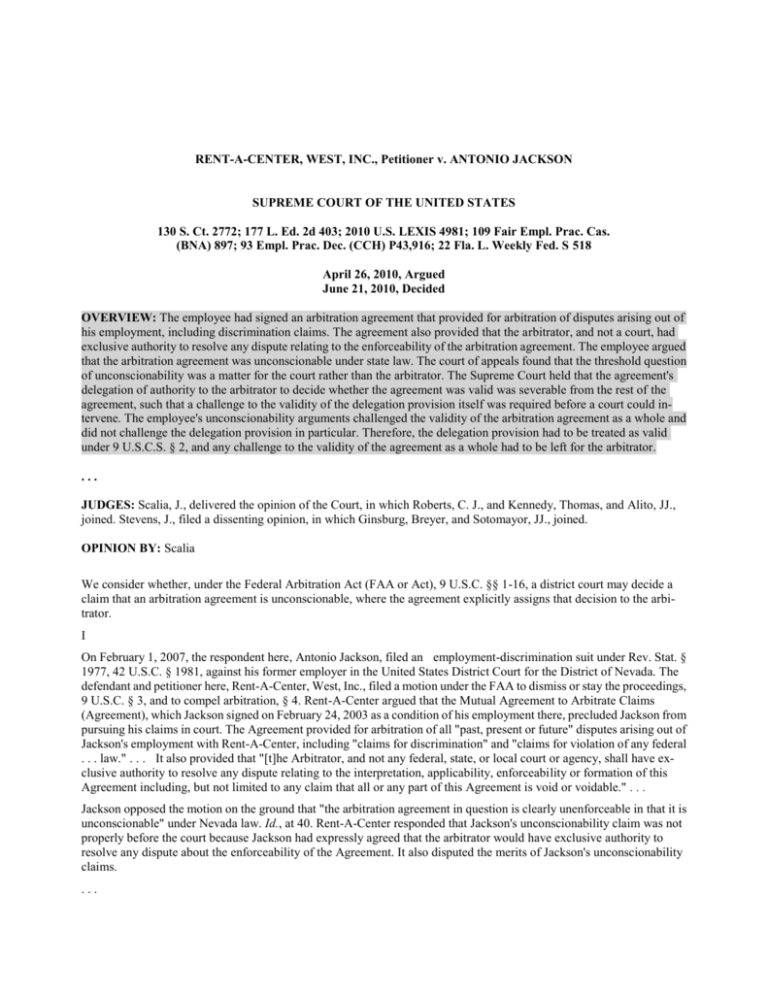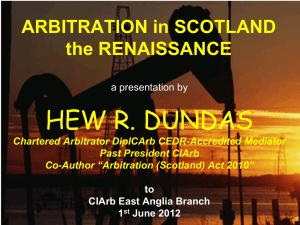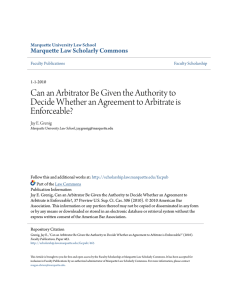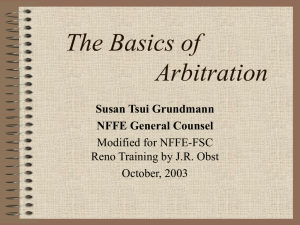RENT-A-CENTER, WEST, INC., Petitioner v. ANTONIO JACKSON
advertisement

RENT-A-CENTER, WEST, INC., Petitioner v. ANTONIO JACKSON SUPREME COURT OF THE UNITED STATES 130 S. Ct. 2772; 177 L. Ed. 2d 403; 2010 U.S. LEXIS 4981; 109 Fair Empl. Prac. Cas. (BNA) 897; 93 Empl. Prac. Dec. (CCH) P43,916; 22 Fla. L. Weekly Fed. S 518 April 26, 2010, Argued June 21, 2010, Decided OVERVIEW: The employee had signed an arbitration agreement that provided for arbitration of disputes arising out of his employment, including discrimination claims. The agreement also provided that the arbitrator, and not a court, had exclusive authority to resolve any dispute relating to the enforceability of the arbitration agreement. The employee argued that the arbitration agreement was unconscionable under state law. The court of appeals found that the threshold question of unconscionability was a matter for the court rather than the arbitrator. The Supreme Court held that the agreement's delegation of authority to the arbitrator to decide whether the agreement was valid was severable from the rest of the agreement, such that a challenge to the validity of the delegation provision itself was required before a court could intervene. The employee's unconscionability arguments challenged the validity of the arbitration agreement as a whole and did not challenge the delegation provision in particular. Therefore, the delegation provision had to be treated as valid under 9 U.S.C.S. § 2, and any challenge to the validity of the agreement as a whole had to be left for the arbitrator. ... JUDGES: Scalia, J., delivered the opinion of the Court, in which Roberts, C. J., and Kennedy, Thomas, and Alito, JJ., joined. Stevens, J., filed a dissenting opinion, in which Ginsburg, Breyer, and Sotomayor, JJ., joined. OPINION BY: Scalia We consider whether, under the Federal Arbitration Act (FAA or Act), 9 U.S.C. §§ 1-16, a district court may decide a claim that an arbitration agreement is unconscionable, where the agreement explicitly assigns that decision to the arbitrator. I On February 1, 2007, the respondent here, Antonio Jackson, filed an employment-discrimination suit under Rev. Stat. § 1977, 42 U.S.C. § 1981, against his former employer in the United States District Court for the District of Nevada. The defendant and petitioner here, Rent-A-Center, West, Inc., filed a motion under the FAA to dismiss or stay the proceedings, 9 U.S.C. § 3, and to compel arbitration, § 4. Rent-A-Center argued that the Mutual Agreement to Arbitrate Claims (Agreement), which Jackson signed on February 24, 2003 as a condition of his employment there, precluded Jackson from pursuing his claims in court. The Agreement provided for arbitration of all "past, present or future" disputes arising out of Jackson's employment with Rent-A-Center, including "claims for discrimination" and "claims for violation of any federal . . . law." . . . It also provided that "[t]he Arbitrator, and not any federal, state, or local court or agency, shall have exclusive authority to resolve any dispute relating to the interpretation, applicability, enforceability or formation of this Agreement including, but not limited to any claim that all or any part of this Agreement is void or voidable." . . . Jackson opposed the motion on the ground that "the arbitration agreement in question is clearly unenforceable in that it is unconscionable" under Nevada law. Id., at 40. Rent-A-Center responded that Jackson's unconscionability claim was not properly before the court because Jackson had expressly agreed that the arbitrator would have exclusive authority to resolve any dispute about the enforceability of the Agreement. It also disputed the merits of Jackson's unconscionability claims. ... II A The FAA reflects the fundamental principle that arbitration is a matter of contract. Section 2, the "primary substantive provision of the Act," Moses H. Cone Memorial Hospital v. Mercury Constr. Corp., 460 U.S. 1, 24, 103 S. Ct. 927, 74 L. Ed. 2d 765 (1983), provides: "A written provision in . . . a contract evidencing a transaction involving commerce to settle by arbitration a controversy thereafter arising out of such contract . . . shall be valid, irrevocable, and enforceable, save upon such grounds as exist at law or in equity for the revocation of any contract." 9 U.S.C. § 2. The FAA thereby places arbitration agreements on an equal footing with other contracts, Buckeye, supra, at 443, 126 S. Ct. 1204, 163 L. Ed. 2d 1038, and requires courts to enforce them according to their terms, Volt Information Sciences, Inc. v. Board of Trustees of Leland Stanford Junior Univ., 489 U.S. 468, 478, 109 S. Ct. 1248, 103 L. Ed. 2d 488 (1989). Like other contracts, however, they may be invalidated by "generally applicable contract defenses, such as fraud, duress, or unconscionability." Doctor's Associates, Inc. v. Casarotto, 517 U.S. 681, 687, 116 S. Ct. 1652, 134 L. Ed. 2d 902 (1996).











